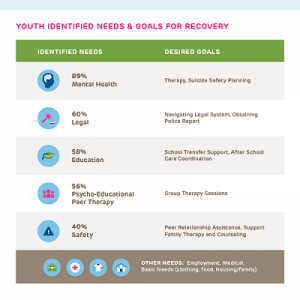Research In Action
Research In Action
Breadcrumb

To uncover the best way to support the healing of assault-injured youth, all you have do is ask. You may even find that their answers surprise you. This is an important first step in how the multidisciplinary team of CHOP’s Violence Intervention Program (VIP) goes beyond treating the physical injuries of assault-injured youth seen at CHOP’s Emergency Department, and provides intensive case management, mental health services, and navigation to other needed services.
In new research released today in the Journal of Adolescent Health, my colleagues and I found that among 49 young men of color ages 12-17 who voluntarily enrolled in CHOP’s VIP program from 2012-2016, the vast majority (89%) self-identified a need for mental health care, with specific goals including therapy, psychiatric evaluation, and suicide safety planning. Adolescent boys also identified legal, education/school, employment, medical, and safety needs (see graphic).
We were surprised that an overwhelming majority of the young men enrolled in VIP told us they wanted mental health care since adolescent males are generally considered less willing to seek such support. This suggests that clinical staff treating assault-injured youth should make mental health a routine part of the healthcare conversation, as this can begin to de-stigmatize issues related to mental health care. Individuals who work closely with adolescents should be knowledgeable and familiar with available resources, comfortable assisting youth with referrals, and able to let youth know help is available in a non-judgmental manner.
This study highlights what members of our team see daily in their work with the youth and families that we serve. The diversity of needs identified suggest that violent injury intersects with more than just physical and mental health, but can touch all areas of youths’ lives. In some cases, in addition to recovering from the violent event, youth and their families are also struggling to meet basic needs like housing, food, and clothing. They may also struggle to navigate complex systems, such as legal and educational, to advocate for themselves following experiences of violence.
A multi-faceted, trauma-informed approach, which allows youth to have both voice and choice in their recovery and enables them to be connected to the necessary resources to support physical recovery, heal from trauma, and promote resiliency in the face of adversity, is vitally important. The results of this research strongly indicate that when asked, violently injured young men will be open about their recovery needs. We just need to be able to ask and listen to them.



